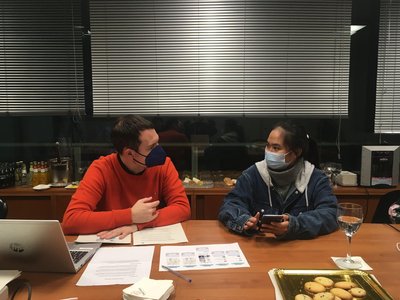The main objective of the TRACTION project is to support social transformation of inequality, using technology to help diverse communities across the European Union participate in the creation of opera. One key challenge of digital co-creation is allowing professionals and community members from diverse cultural, language, and technology backgrounds to easily have conversations about media. As part of the project, the DIS group at CWI is developing The Co-creation Space, a platform that supports professionals and community members from diverse backgrounds to engage in creative discussion about media in a “safe space.” The tool was recently piloted together with the LICEU opera house in Barcelona.
DIS group pilots the Co-creation Space (CCS) for Digital Humanities together with the LICEU Opera in Barcelona
As part of the TRACTION project the DIS group at CWI is developing The Co-creation Space, a platform that supports professionals and community members from diverse backgrounds to engage in creative discussion about media in a “safe space".
Liceu open pilot
DIS is conducting a ten (10) month open pilot deployment with eleven (11) amateur choirs who will perform in La Gata Perduta, a community opera created by the Liceu Opera with Opera Prima Raval. The 199 choir participants range in age and experience in technology, and include one choir of minors. The Co-creation Space will help these groups with the rehearsal process as a way of learning and rehearsing music, and getting to know one another’s style and singing. They will be encouraged to comment on one another’s work, so a consistent style can emerge from their work, guided by Cristina Colomer.
The currently ongoing pilot is divided into two phases: from September 2021 through January 2022, participants used the precedent version of the tool that was developed and tested in 2020. From February 2022, participants are using a state-of-the-art version of the Co-creation Space that was developed and tested at the end of 2021. The pilot will run through June 2022. The goal of this open pilot is to validate the workflow of the Co-Creation Space, and to understand participant interactions during co-creation processes.

A Liceu choir member participating in the usability pilot activity
User centered process
In complement of the feedback received from the two open pilots, DIS researchers completed a user-centered process to gather new technology requirements, and to test their usability. To do this, they held 5 codesign sessions with 25 participants to gather user requirements regarding privacy, smart upload and commenting/editing features, and a narrative summary tool. Over two hours zoom sessions, the co-design sessions introduced participants to the CCS, and generated discussions about requirements for the tool and creative ideas about functionality. Requirements gathered during these sessions were reviewed by trial leaders during three feedback sessions, and fed into a set of interface designs for the tool. These included 1) a hierarchy of privacy and an interface to set user permissions, 2) a personal activity page that includes drafts and media pinboard, and 3) new smart upload and editing features for images and videos.
We tested the second year functionality with ten participants from the open pilot at the LICEU opera house in Barcelona. During approximately an hour, users assessed the usability of the Co-creation Stage’s new features through four guided tasks, that included updating interests and permission settings, adding images to a media collection, and interacting with new drawing and chapter creation functionality. At the end of the study, we gathered open-ended feedback on the value of the new functionality in the context of the LICEU open pilot experience (e.g. How does the process you just experienced with the CCS compare to your current experience during the open pilot? How does it compare to other platforms?)
Results and next steps
Overall, our study findings were positive and constructive. Participants found the new functionality clear and easy to use, and felt safe using the CCS, although they saw the CCS as a working tool rather than a personal social tool. In addition, participants were impressed with the media boards, drafts, image editing and video highlight features. Users also provided valuable feedback about the design of the tool; they pointed out some names and icons that were not clear, and wanted the interface to look more artistic. They also suggested new features that could improve the tool; such as being able to save posts, filter comments,share media folders organised by group leaders, use a chat feature, and login without a password.
Using participant usability feedback, we iterated on the design of the tool, so that LICEU pilot participants could have access to the valuable new features. By testing these new features in the second phase of the open pilot, we will be able to see how the new functionality affects user relationships and the co-creation process. We plan to publish the results of this work at the end of 2022.
Related News:
DIS group develops Co-Creation Space for digital humanities
DIS starts two projects on digital humanities: TRACTION and MediaScape
